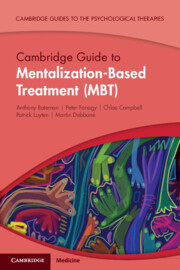Book contents
- Cambridge Guide to Mentalization-Based Treatment (MBT)
- Cambridge Guides to the Psychological Therapies
- Reviews
- Cambridge Guide to Mentalization-Based Treatment (MBT)
- Copyright page
- Contents
- Preface
- A Note from the Series Editor
- Acknowledgments
- Part I Overview of the Model
- Part II The Mentalization-Based Treatment Model in Practice
- Part III Application and Adaptations for Mental Health Presentations
- Chapter 6 Narcissistic Personality Disorder
- Chapter 7 Antisocial Personality Disorder
- Chapter 8 Avoidant Personality Disorder
- Chapter 9 Depression
- Chapter 10 Psychosis
- Chapter 11 Trauma
- Chapter 12 Eating Disorders
- Part IV Application of Mentalization-Based Treatment in Different Populations and in Different Settings
- Index
- References
Chapter 12 - Eating Disorders
from Part III - Application and Adaptations for Mental Health Presentations
Published online by Cambridge University Press: 18 May 2023
- Cambridge Guide to Mentalization-Based Treatment (MBT)
- Cambridge Guides to the Psychological Therapies
- Reviews
- Cambridge Guide to Mentalization-Based Treatment (MBT)
- Copyright page
- Contents
- Preface
- A Note from the Series Editor
- Acknowledgments
- Part I Overview of the Model
- Part II The Mentalization-Based Treatment Model in Practice
- Part III Application and Adaptations for Mental Health Presentations
- Chapter 6 Narcissistic Personality Disorder
- Chapter 7 Antisocial Personality Disorder
- Chapter 8 Avoidant Personality Disorder
- Chapter 9 Depression
- Chapter 10 Psychosis
- Chapter 11 Trauma
- Chapter 12 Eating Disorders
- Part IV Application of Mentalization-Based Treatment in Different Populations and in Different Settings
- Index
- References
Summary
There is considerable evidence of mentalizing problems in patients with eating disorders, with non-mentalizing modes, especially in relation to body weight and shape, being dominant. The mentalizing model assumes the existence of developmental vulnerabilities, especially during adolescence, and that the range of different symptoms associated with eating disorders may have the common function of being attempts at social self-regulation. Controlling eating is a way of managing social and emotional developmental milestones that the person perceives as insuperable. Patients with eating disorders become stuck in a low mentalizing experience of themselves and their bodies. Clinical treatment based on this formulation is discussed as it is applied in a combined program of individual and group psychotherapy, together with psychoeducation.
Keywords
- Type
- Chapter
- Information
- Cambridge Guide to Mentalization-Based Treatment (MBT) , pp. 298 - 318Publisher: Cambridge University PressPrint publication year: 2023

